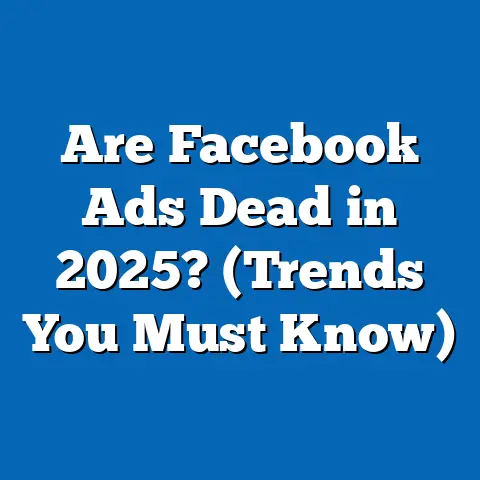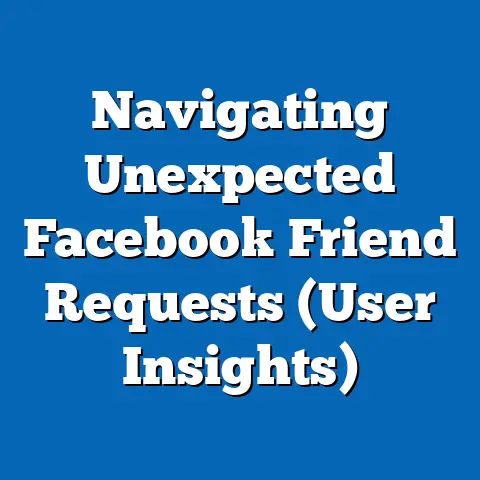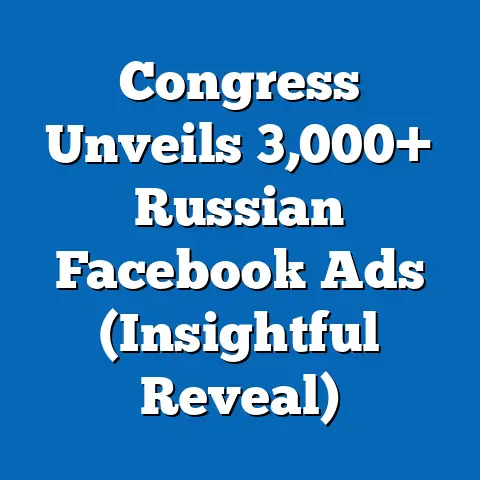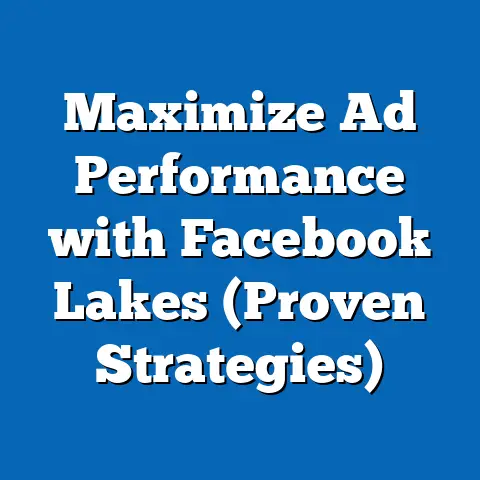Mastering fb ad Control: Deactivate Campaigns Like a Pro (Essential Guide)
Mastering FB Ad Control: Deactivate Campaigns Like a Pro (Essential Guide)
Introduction: A Costly Oversight That Shook a Small Business
In 2021, a small e-commerce business owner named Sarah launched her first Facebook ad campaign to promote a seasonal product line.
With a modest budget of $500, she expected modest results but was thrilled when the campaign initially drove a surge of traffic to her online store.
However, a week later, Sarah forgot to monitor the campaign’s performance and failed to deactivate it after the promotion ended, allowing the ad to run unchecked for an additional two weeks, draining over $1,200 from her account with little return on investment.
Sarah’s story is not unique.
Many small business owners, freelancers, and even seasoned marketers have faced similar pitfalls due to a lack of control over their Facebook (Meta) ad campaigns.
This incident underscores a critical skill in the digital marketing landscape: mastering the ability to deactivate campaigns effectively and strategically.
Defining Characteristics of Effective Facebook Ad Control
Effective control over Facebook ad campaigns involves more than simply launching or stopping an ad.
It requires a strategic approach to budgeting, targeting, monitoring, and, critically, deactivation.
At its core, ad control is about maintaining oversight of every aspect of a campaign to ensure it aligns with business goals while minimizing waste.
One key characteristic is proactive monitoring.
Successful marketers regularly check metrics such as click-through rates (CTR), cost per click (CPC), and return on ad spend (ROAS) to determine whether a campaign is performing as expected.
If performance dips, they are quick to adjust or deactivate the campaign to prevent further losses.
Another defining trait is budget discipline.
Setting clear spending limits and sticking to them prevents scenarios like Sarah’s, where unchecked ads drain resources.
Tools like Facebook’s Ads Manager allow users to set daily or lifetime budgets and automate pauses when limits are reached.
Lastly, strategic deactivation is a hallmark of ad control mastery.
Knowing when and how to stop a campaign—whether due to poor performance, changing business priorities, or completed objectives—ensures resources are allocated efficiently.
This involves not just clicking “pause” but analyzing data to inform future campaigns.
These characteristics are not innate; they are skills developed through experience, education, and sometimes costly mistakes.
As digital advertising continues to dominate marketing budgets, mastering these traits becomes essential across industries and demographics.
Historical Context: The Evolution of Digital Advertising and Facebook Ads
To understand the importance of mastering Facebook ad control, it’s crucial to trace the evolution of digital advertising and the platform’s role in shaping modern marketing.
The late 1990s marked the dawn of online advertising with the introduction of banner ads, which were rudimentary and often ignored by users.
However, the early 2000s saw rapid advancements with the rise of search engine marketing, particularly through Google AdWords (now Google Ads), which introduced pay-per-click (PPC) models.
Facebook entered the scene in 2007 with its advertising platform, initially offering basic ad formats like sidebar promotions.
By 2012, the platform had evolved into a powerhouse with sophisticated targeting options based on user demographics, interests, and behaviors.
This shift coincided with the global rise of social media, transforming how businesses connect with consumers.
The introduction of mobile advertising further accelerated Facebook’s dominance.
By 2016, mobile ads accounted for over 80% of the platform’s ad revenue, reflecting a broader societal shift toward smartphone usage.
Today, Meta (Facebook’s parent company) boasts over 10 million active advertisers, with ad revenue reaching $114.9 billion in 2022 alone, according to Statista.
This historical trajectory reveals why ad control is so critical.
As Facebook ads became more complex and costly, the potential for financial missteps grew.
Early adopters often struggled with overspending due to a lack of tools or knowledge about deactivation and optimization.
Over time, Meta introduced features like automated rules and budget caps, but the onus remains on users to leverage these tools effectively.
Generational shifts also play a role in this context.
Millennials (born 1981–1996) and Gen Z (born 1997–2012), often dubbed “digital natives,” grew up alongside these technological advancements and are generally more adept at navigating platforms like Facebook Ads Manager.
In contrast, Baby Boomers (born 1946–1964) and some Gen Xers (born 1965–1980) may face a steeper learning curve, reflecting broader generational differences in tech adoption.
Step-by-Step Guide to Deactivating Campaigns Like a Pro
Mastering the deactivation of Facebook ad campaigns requires a structured approach.
Below is an essential guide to ensure efficiency and avoid common pitfalls.
1. Assess Campaign Performance Before Deactivation
Before hitting the pause button, evaluate the campaign’s performance using key metrics in Ads Manager.
Look at indicators like ROAS, CTR, and conversion rates to determine if the campaign is underperforming or if external factors (e.g., seasonality) are at play.
This data-driven approach prevents premature deactivation of potentially salvageable campaigns.
If the campaign has met its objective—such as generating a target number of leads—it’s time to stop it to avoid unnecessary costs.
Documenting these insights also informs future strategies.
2. Use the Correct Deactivation Method
Facebook offers multiple ways to deactivate a campaign, each with distinct implications.
Pausing a campaign temporarily halts it without deleting data, allowing you to resume later.
Turning off a campaign at the ad set or campaign level stops delivery permanently unless reactivated.
To deactivate, navigate to Ads Manager, select the campaign, and toggle the status to “off.” For bulk deactivation, use the checkbox feature to select multiple campaigns or ad sets.
Always double-check to ensure the correct items are selected to avoid disrupting active, high-performing ads.
3. Set Automated Rules for Proactive Control
One of the most powerful tools in Facebook Ads Manager is the ability to create automated rules.
For instance, you can set a rule to pause a campaign if daily spend exceeds a certain threshold or if CTR falls below a specified level.
This minimizes manual oversight and prevents budget overruns.
To set up automated rules, go to the “Automated Rules” tab in Ads Manager, click “Create Rule,” and define your conditions.
Regularly review these rules to ensure they align with evolving campaign goals.
4. Analyze Post-Deactivation Data
Deactivation isn’t the end of the process; it’s a learning opportunity.
After stopping a campaign, review its performance data to identify what worked and what didn’t.
Was the targeting too broad?
Did the creative fail to resonate?
Use these insights to refine future campaigns.
Meta provides detailed reports under the “Reports” tab, allowing you to export data for deeper analysis.
Tools like Google Analytics can also track downstream effects, such as website conversions post-campaign.
5. Communicate with Stakeholders
For businesses with teams or clients, communicate the reasons for deactivation to ensure transparency.
Share performance summaries and explain how the decision aligns with broader marketing goals.
This builds trust and ensures everyone is on the same page for future campaigns.
Following these steps transforms deactivation from a reactive measure into a strategic tool.
It’s not just about stopping ads; it’s about optimizing resources and learning from each campaign cycle.
Societal Implications: The Broader Impact of Ad Control Mastery
The ability to control Facebook ad campaigns extends beyond individual businesses or marketers; it has far-reaching societal and economic implications.
At a macro level, effective ad control contributes to a more efficient digital economy by reducing wasted ad spend, which globally amounts to billions annually.
According to a 2021 report by Juniper Research, digital ad fraud alone cost businesses $42 billion, a figure compounded by poorly managed campaigns.
For small businesses, particularly those run by younger generations like Millennials and Gen Z, mastering ad control can be a lifeline.
These demographics often operate with limited budgets and rely on digital platforms to compete with larger corporations.
A single misstep, like failing to deactivate a campaign, can jeopardize their financial stability, as seen in Sarah’s story.
Conversely, larger corporations with dedicated marketing teams can leverage ad control to maximize ROI, influencing market dynamics.
Their ability to fine-tune campaigns impacts consumer behavior on a massive scale, shaping trends and purchasing patterns.
For instance, well-timed deactivation and reactivation of seasonal campaigns can drive demand during peak shopping periods like Black Friday.
Generational differences also manifest in societal impacts.
Baby Boomers and Gen Xers, who may be less familiar with digital tools, often outsource ad management or struggle with inefficiencies, potentially widening the digital divide.
Meanwhile, younger generations’ fluency with platforms like Facebook can give them a competitive edge in entrepreneurship and marketing careers, reinforcing generational disparities in economic opportunity.
Culturally, the precision of ad control influences the type of content consumers encounter.
Overactive or poorly targeted campaigns can lead to ad fatigue, where users become desensitized to marketing messages, as noted in a 2020 Nielsen study.
Strategic deactivation helps maintain a balance, ensuring ads remain relevant without overwhelming audiences.
In the workplace, ad control skills are increasingly in demand across industries.
Marketing roles now often require proficiency in platforms like Facebook Ads Manager, and employees who can demonstrate mastery of campaign deactivation and optimization stand out.
This trend underscores the need for continuous learning and adaptation, particularly for older workers navigating a tech-driven job market.
Generational Perspectives on Digital Ad Management
Generational cohorts approach Facebook ad control with varying levels of comfort and expertise, shaped by their unique historical and technological contexts.
Understanding these differences provides insight into how ad control mastery is adopted across age groups.
Baby Boomers (1946–1964)
Baby Boomers grew up in an era dominated by traditional advertising—think print ads and TV commercials.
Their exposure to digital tools came later in life, often through professional necessity rather than personal interest.
As a result, many Boomers may find Facebook ad control challenging, relying on younger team members or external agencies for support.
However, Boomers who have adapted to digital marketing often bring a wealth of strategic insight from decades of business experience.
Their focus tends to be on high-level goals rather than granular tasks like deactivation, reflecting a generational preference for delegation over hands-on tech engagement.
Generation X (1965–1980)
Gen Xers straddle the analog and digital worlds, having witnessed the internet’s rise during their formative career years.
Many are comfortable with technology but may not be as intuitive with newer platforms like Facebook Ads compared to younger generations.
Their approach to ad control often emphasizes practicality, focusing on cost efficiency and measurable outcomes.
Gen X marketers are likely to appreciate automated tools for deactivation, as they balance professional demands with personal responsibilities.
Their adaptability makes them quick learners, though they may not experiment as freely as younger cohorts.
Millennials (1981–1996)
Millennials, as digital natives, are generally adept at navigating social media platforms, including Facebook Ads Manager.
Having entered the workforce during the social media boom, they often view digital advertising as a core component of marketing.
Their comfort with data analysis and multitasking enables them to monitor and deactivate campaigns with ease.
This generation also values creativity, often testing multiple ad variations before deciding to pause underperforming ones.
However, their reliance on digital tools can sometimes lead to overconfidence, resulting in oversight errors like forgetting to set budget caps.
Generation Z (1997–2012)
Gen Z takes digital fluency to the next level, having grown up with smartphones and social media as constants.
For them, mastering Facebook ad control is often second nature, and they are quick to adopt new features or hacks to optimize campaigns.
Their approach is experimental, frequently leveraging trends like influencer marketing or short-form video ads.
However, Gen Z’s relative inexperience in professional settings can lead to impulsive decisions, such as deactivating campaigns prematurely without fully analyzing data.
Mentorship from older generations can help balance their innovative spirit with strategic discipline.
These generational nuances highlight the diversity within the digital marketing landscape.
While technology levels the playing field in some respects, experience, adaptability, and learning styles shape how each cohort approaches ad control.
Organizations benefit most from fostering cross-generational collaboration, combining tech-savvy with seasoned strategy.
Technological, Economic, and Cultural Factors Shaping Ad Control
Several external factors influence the mastery of Facebook ad control, reflecting broader trends in technology, economics, and culture.
Technological Factors
The rapid evolution of advertising platforms demands constant learning.
Meta frequently updates Facebook Ads Manager with new features, such as AI-driven targeting or privacy-focused tools post-iOS 14.5 updates in 2021, which impacted ad tracking.
Marketers must stay informed to leverage these changes for effective deactivation and optimization.
Automation is another game-changer.
Tools like automated rules and third-party software (e.g., Hootsuite or Sprout Social) reduce manual effort in campaign management.
However, over-reliance on automation can lead to errors if rules are misconfigured, emphasizing the need for human oversight.
Economic Factors
Economic conditions directly impact ad budgets and, by extension, the importance of ad control.
During recessions or periods of inflation, businesses tighten marketing budgets, making every dollar spent on ads critical.
A 2022 survey by Marketing Week found that 60% of marketers faced budget cuts due to economic uncertainty, heightening the need for precise deactivation to avoid waste.
For small businesses, economic pressures amplify the stakes.
Unlike corporations with buffer funds, a single overrunning campaign can cripple their finances, as seen in Sarah’s case.
Mastery of ad control thus becomes an economic survival skill for entrepreneurs.
Cultural Factors
Culturally, the perception of advertising influences how campaigns are managed.
In consumer-driven societies, ads are often seen as intrusive if overplayed, pushing marketers to deactivate irrelevant or poorly performing campaigns quickly.
A 2021 Edelman Trust Barometer report noted that 48% of global consumers distrust ads, underscoring the need for relevance over volume.
Generational cultural values also play a role.
Millennials and Gen Z prioritize authenticity and social impact, often pausing campaigns that don’t align with ethical messaging.
Older generations may focus more on traditional ROI metrics, reflecting differing cultural priorities in marketing strategy.
These intersecting factors illustrate that ad control is not just a technical skill but a response to dynamic external forces.
Marketers must navigate technological updates, economic constraints, and cultural expectations to master campaign deactivation effectively.
Implications for Society, Culture, and the Workplace
The mastery of Facebook ad control reverberates across multiple domains, shaping societal trends, cultural norms, and workplace dynamics.
Societal Implications
At a societal level, effective ad control contributes to a more balanced digital ecosystem.
By deactivating irrelevant or oversaturated campaigns, marketers reduce ad fatigue, fostering a healthier relationship between brands and consumers.
This is particularly relevant as privacy concerns grow, with initiatives like the General Data Protection Regulation (GDPR) and California Consumer Privacy Act (CCPA) pushing for transparency in ad practices.
Inequities in ad control skills also reflect broader societal divides.
Small businesses or individuals without access to training may struggle to compete, perpetuating economic disparities.
Bridging this gap through accessible education and tools is crucial for equitable participation in the digital economy.
Cultural Implications
Culturally, ad control influences the narratives consumers encounter.
Strategic deactivation ensures that only relevant, high-quality ads reach audiences, shaping perceptions of brands and products.
This can reinforce cultural values if campaigns align with societal trends, such as sustainability or diversity, or backfire if ads are seen as tone-deaf.
The generational lens adds complexity.
Younger generations often drive cultural shifts through social media, and their ad control practices—favoring authenticity over spam—can redefine marketing norms.
Older generations, adapting to these shifts, contribute stability and perspective, creating a cultural dialogue through advertising strategies.
Workplace Implications
In the workplace, ad control proficiency is becoming a core competency.
Marketing roles increasingly demand hands-on experience with platforms like Facebook Ads Manager, and employees who can optimize and deactivate campaigns effectively are highly valued.
A 2023 LinkedIn report identified digital marketing as one of the top-growing job categories, with ad management skills in high demand.
This trend also reshapes workplace training.
Companies invest in upskilling programs to bridge generational tech gaps, fostering environments where Boomers and Gen Z alike can collaborate on ad strategies.
Such initiatives not only enhance campaign outcomes but also promote inclusivity and knowledge sharing.
Conclusion: Forward-Looking Insights and Uncertainties
Mastering Facebook ad control, particularly the art of deactivating campaigns like a pro, is an essential skill in today’s digital landscape.
From small business owners like Sarah to multinational corporations, the ability to monitor, optimize, and stop campaigns strategically can determine financial success or failure.
This guide has outlined the defining characteristics of effective ad control, provided a historical context for digital advertising’s evolution, and offered a step-by-step approach to deactivation.
The societal implications are profound, influencing economic efficiency, cultural narratives, and workplace dynamics.
Generational differences add nuance, with each cohort bringing unique strengths and challenges to ad management.
Technological, economic, and cultural factors further shape how this skill is adopted and applied, highlighting the need for continuous adaptation.
Looking ahead, the future of ad control remains dynamic and uncertain.
Meta’s ongoing updates, such as AI-driven tools and privacy regulations, will likely redefine best practices for deactivation and optimization.
Economic volatility may further constrain budgets, making precision in ad spend even more critical.
Meanwhile, generational shifts—such as Gen Z’s growing influence in the workforce—will continue to shape marketing strategies and cultural expectations.
One certainty is the need for education and collaboration.
As digital advertising evolves, so must the skills of those who wield it.
By fostering cross-generational learning and embracing technological advancements, businesses and individuals can navigate the complexities of Facebook ad control with confidence.
While challenges remain, the potential for mastery offers a pathway to not just surviving but thriving in the ever-changing world of digital marketing.






